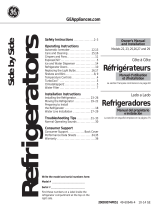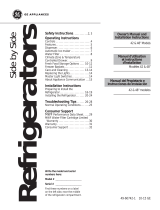
IMPORTANT SAFETY INFORMATION.
READ ALL INSTRUCTIONS BEFORE USING.
2
IMPORTANT SAFETY INFORMATION READ ALL INSTRUCTIONS BEFORE USING
GE Appliances website
For more information on your refrigerator’s operation, visit www.GEAppliances.com or
call 800.GECARES (800.432.2737). In Canada visit GEAppliances.ca or call 800.561.3344.
This is the safety alert symbol. This symbol alerts you to potential hazards that can kill or hurt you and others. All
safety messages will follow the safety alert symbol and the word “DANGER”, “WARNING”, or “CAUTION”. These words are
defined as:
DANGER
Indicates a hazardous situation which, if not avoided, will result in death or serious injury.
WARNING
Indicates a hazardous situation which, if not avoided, could result in death or serious injury.
CAUTION
Indicates a hazardous situation which, if not avoided, could result in minor or moderate injury.
IMPORTANT SAFETY INSTRUCTIONS
To reduce the risk of fire, explosion, electric shock, or injury when using your
refrigerator follow these basic safety precautions:
REFRIGERATOR SAFETY INFORMATION
SAFETY
WARNING
WARNING
Explosion Hazard.
Keep flammable materials and vapors, such as gasoline, away from refrigerator. Failure to do so
can result in fire, explosion, or death.
This refrigerator must be properly installed and located in
accordance with the Installation Instructions before it is
used.
Unplug the refrigerator before cleaning and making repairs.
NOTE: Repairs must be performed by a qualified Service
Professional.
Replace all parts and panels before operating.
Because of potential safety hazards under certain
conditions, we strongly recommend against the use of an
extension cord. However, if you must use an extension cord,
it is absolutely necessary that it be a UL-listed (in the United
States) or a CSA certified (in Canada), 3-wire grounding type
appliance extension cord having a grounding type plug
and outlet and that the electrical rating of the cord be 15
amperes (minimum) and 120 volts.
To prevent suffocation and entrapment hazards to children,
Remove the fresh food and freezer doors from any
refrigerator before disposing of it or discontinuing its use.
Do not store or use gasoline or other flammable vapors and
liquids in the vicinity of this or any other appliance.
Power to the refrigerator cannot be disconnected by
any setting on the control panel, refrigerator must be
unplugged to remove power.
Do not allow children to climb, stand or hang on the door
handles or the shelves in the refrigerator. They could
seriously injure themselves.
In refrigerators with automatic ice makers, avoid contact
with the moving parts of the ejector mechanism, or with
the heating element that releases the cubes. Do not place
fingers or hands on the automatic ice making mechanism
while the refrigerator is plugged in.
Do not clean glass shelves or covers with warm water
when they are cold. Glass shelves and covers may break if
exposed to sudden temperature changes or impact, such
as bumping or dropping. Tempered glass is designed to
shatter into many small pieces if it breaks.
Keep fingers out of the “pinch point” areas; clearances
between the doors and between the doors and cabinet are
necessarily small. Be careful closing doors when children
are in the area.
Do not touch the cold surfaces in the freezer compartment
when hands are damp or wet., skin may stick to these
extremely cold surfaces.
Do not refreeze frozen foods which have thawed
completely.
Before replacing a burned-out light bulb, the refrigerator
should be unplugged in order to avoid contact with a live
wire filament. (A burned-out light bulb may break when
being replaced.)






















